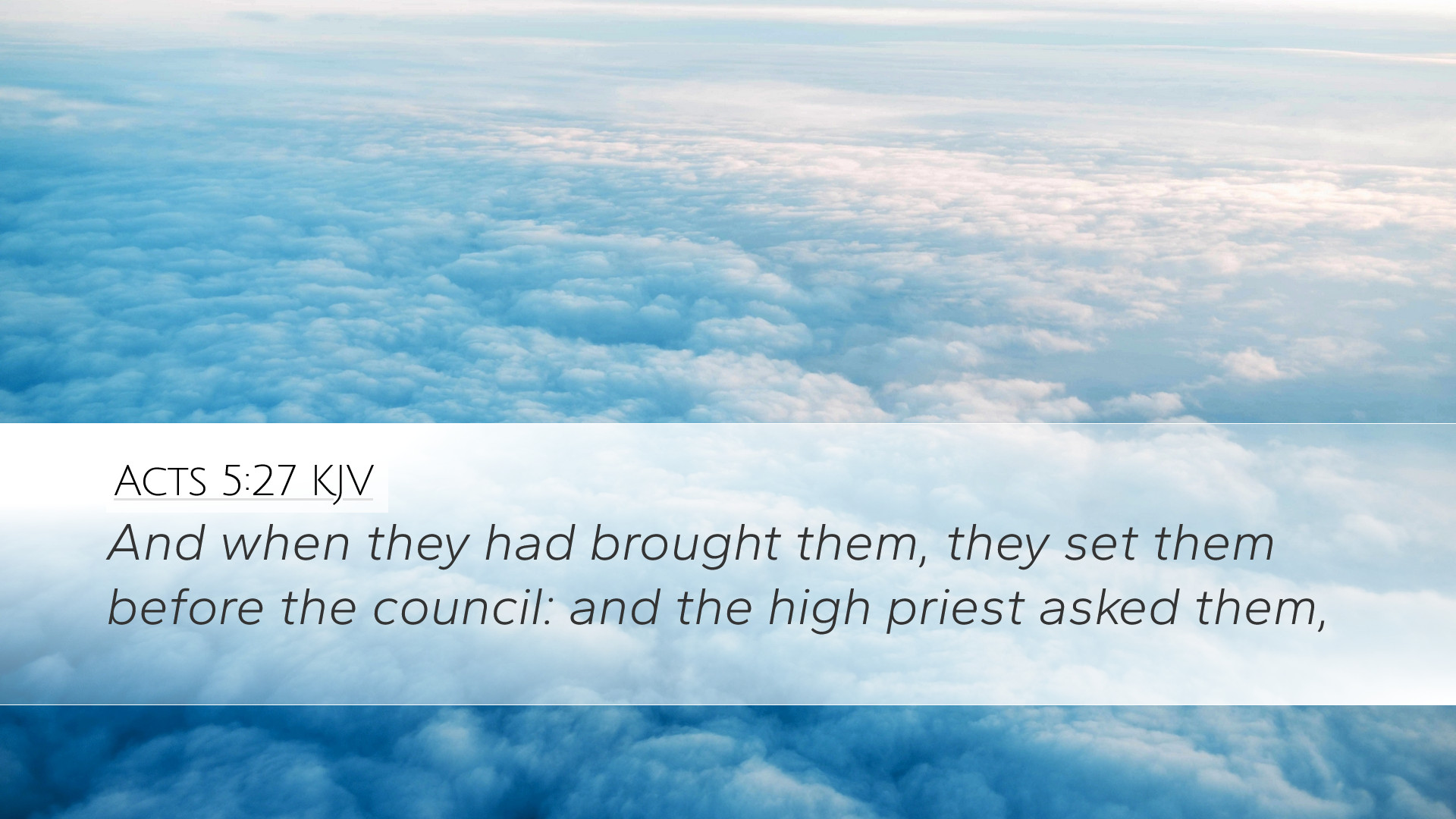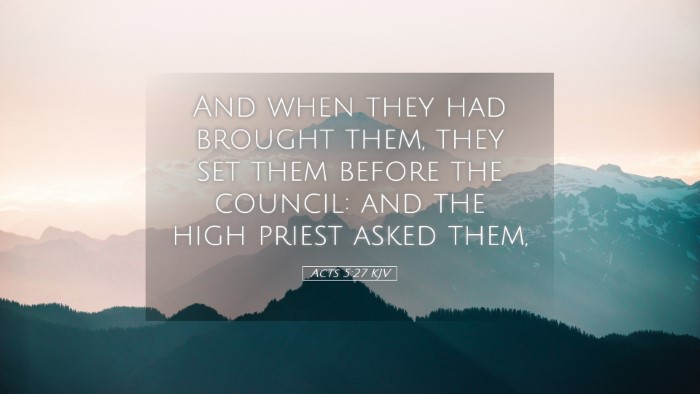Commentary on Acts 5:27
Acts 5:27 states, "And when they had brought them, they set them before the council: and the high priest asked them." This verse is pivotal as it indicates a significant moment where the apostles are summoned before the Jewish council, marking a confrontation between the early Christian movement and Jewish authority. Various public domain commentaries provide insights that deepen understanding of this verse.
Contextual Background
The context of Acts 5 involves the apostles' ministry in Jerusalem and the rapid growth of the early Church. The apostles had been preaching boldly about Jesus Christ, resulting in miraculous signs and wonders. This growing influence, however, prompted the Jewish religious leaders to take action against them.
Matthew Henry's Commentary
Matthew Henry emphasizes the boldness of the apostles in their witness to Christ, even in the face of opposition. He notes:
- The apostles were arrested due to their disobedience to the Sanhedrin's command to cease teaching in the name of Jesus (Acts 5:18).
- Henry highlights the significance of their appearance before the council as a testament to their faithfulness to God's commission despite the risks involved.
- He also reflects on the members of the Sanhedrin as representing human authority that stands in contrast to divine authority, illustrating the ongoing conflict between the two.
Albert Barnes' Analysis
Albert Barnes delves into the implications of this confrontation, observing that:
- The high priest's interrogation signifies a critical moment where human power seeks to challenge the mandate of God through the apostles.
- Barnes writes about the intentions of the council, indicating their desire to suppress the influence of the apostles and maintain control over the temple and religious life in Jerusalem.
- He also notes the apostolic response to persecution, implying that such hardships were expected as part of their ministry and mission, drawing strength from their unwavering commitment to preaching the gospel.
Adam Clarke's Observations
Adam Clarke provides insightful observations regarding the socio-political climate of the time:
- Clarke reflects on the dynamics of power, explaining how the Sanhedrin was threatened by the apostles' growing popularity among the people.
- He comments on the role of the high priest, who was not just a religious leader but a political figure within the Jewish community, thus illustrating the merging of religious and political matters in this confrontation.
- Clarke also emphasizes the importance of this trial, which serves to validate the apostles’ mission and prepares them for the suffering they would face as they continued to bear witness to Christ.
Theological Implications
This encounter has profound theological implications, particularly concerning the nature of authority and obedience. The apostles’ willingness to stand before the council illustrates their understanding of divine authority superseding human authority.
Obedience to God vs. Human Authority
As discussed in the commentaries, the apostles exhibit a biblical principle of prioritizing obedience to God:
- In Acts 5:29, Peter boldly declares, "We ought to obey God rather than men." This proclamation encapsulates the spirit of the early Church’s commitment to the gospel.
- Their willingness to be imprisoned rather than silent about Christ’s resurrection encourages readers to consider their own priorities and allegiances.
- This also invites a reflection on modern-day applications where believers must discern between convenience and conviction in their faith journeys.
Persecution and its Purpose
Persecution is an inevitable aspect of the Christian experience, as highlighted in these commentaries:
- Henry notes that persecution often serves to strengthen the resolve of believers, as they are drawn closer to God through trials.
- Barnes suggests that persecution can serve to advance the gospel, as the apostles’ boldness in answering the council created opportunities for further witness.
- Clarke emphasizes that suffering for the gospel’s sake is a badge of honor, aligning believers with the experiences of Christ Himself.
Applications for Modern Believers
The insights gleaned from Acts 5:27 can be applied in several ways:
- Standing Firm in Faith: Just as the apostles stood firm before the council, modern believers are called to steadfastness in their beliefs, especially in challenging times.
- Courageous Witness: The boldness of the apostles can inspire believers to witness courageously even when facing opposition or ridicule.
- Embracing Persecution: Understanding the role of persecution as part of the Christian journey is vital; it refines faith and can lead to opportunities for growth and deeper fellowship with Christ.
Conclusion
The narrative surrounding Acts 5:27 serves as a significant reminder of the early Church's challenges and triumphs. Insights from Matthew Henry, Albert Barnes, and Adam Clarke not only illuminate the historical and theological significance of this verse but also encourage personal reflection and application for modern believers. As the early followers of Christ faced their earthly authorities with boldness, may contemporary Christians likewise find the strength to uphold their faith in the face of opposition, remaining ever faithful to their divine calling.


